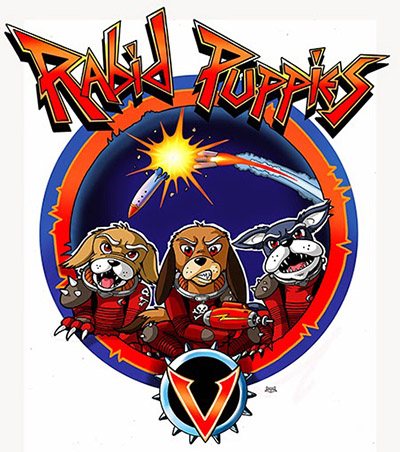Editor’s note: This is a co-authored post by Lina Eklund and Evan Conaway.
A war is raging
On the internet, a war for identity is being fought in the previously hidden depths of nerd subcultures. In this post we offer a view from the trenches, examining the rise of a new nerd as different opposing sides embrace the networked structure of online social life. We propose that shifting nerd identities offer new venues for thinking through how technology shapes and is shaped by culture.
During the last half-decade, “alt-righters” (we are using the term loosely) and so-called “social justice warriors” (or SJWs) have exchanged blows on social media networks, forums, news-sites, etc. Seemingly everywhere on the internet the right to define oneself as a nerd is being contested at institutional, commercial, technical, and social levels. Originally the preoccupation of a select group of white men, being a nerd is now available to everyone, everywhere as subcultures expand into mainstream culture.
In 2014 digital gaming had been undergoing a demographic shift, and cultural growing pains gave birth to the #Gamergate movement. Under the guise of fighting for “ethics in journalism,” gamers were systematically and violently harassing, stalking, and doxxing women who had the guts to voice their opinions about video games, or worse, dared make them. Gamergate has since been nearly silenced and in its wake space has opened up for conversations about minority representation in games. For more on Gamergate, we recommend this essay.
At the same time as the more well-known Gamergate, a similar fight was underway in the neighboring nerd field of science fiction and fantasy literature, specifically the Hugo Awards. The Hugos are a prestigious science fiction and fantasy (SFF) award-granting institution. Some of the finest SFF authors have received a Hugo and being awarded one is a great acknowledgement. Giants like Octavia Butler, Ursula Le Guin, Isaac Asimov, and Samuel Delaney are among previous winners.

The SFF genre is large, and has historically been dominated by white male voices, despite the genre’s potential to explore and deconstruct our contemporary times and imagine different ways of being. In recent years, authors who were non-white, non-male, and non-straight—and stories written about similarly diverse protagonists—began to emerge as victors at the Hugo Awards, representing a sea change in the landscape of SFF subculture. In response, two related counter-movements developed, Sad Puppies and Rabid Puppies, together forming what is now called Puppygate. Instead of “ethics in journalism,” the groups claimed opposition to “literary” and “speculative” fiction, wanting to return SFF literature to its roots. The puppies proposed slates of SFF works, largely composed of white male authors to be nominated as down-the-ballot bloc votes. It is no coincidence that the Rabid Puppies leader is a radical conservative SFF writer and avid Gamergate supporter.
With this strategy, the Puppygate movements had some success between 2013-2015, with many categories dominated by puppies’ nominees. Yet many awards were given to “No Award,” meaning that a majority of voters preferred to withhold the award from anyone rather than give it to a slated finalist. While the puppies claimed this as a win, the 2016 Hugos saw what might be deemed a Puppy “fail.” Many authors openly rejected their presence on Puppy slates, or even declined a Puppy-led nomination. Perhaps the greatest indicator of their downfall were the winners, which included many women of color, works of speculative fiction, and only two “No Awards,” with the Best Novel award going to N.K. Jemisin for The Fifth Season. For an in-depth summary of Puppygate, we recommend this excellent essay.
Embracing the network
Puppygate and Gamergate can be seen as backlash movements leaking into popular consciousness as their respective subculture grows and identities shift. The nerd identity is no longer a safe haven for white, straight men but has become a place for a great variety of people to find a home. This transformation is causing resistance, perhaps to be expected when a majority group loses power.
Both movements have been characterized by harassments and silencing tactics, and of course their chosen battleground have been the internet. Both subcultures are indeed intimately linked to their strong—and long—online presence; after all, at the birth of the internet, the first online community was a sci-fi mailing list called SF-Lovers active already in 1975. At the same time, gamers have always had a strong presence online. Characterized collectively as nerd culture, gamers and SFF fans could come together online with the like-minded and here find an identity as well as community.
We can understand these wars as clashes that occur as large groups of actors try to enforce their meaning as the dominating one. Gamergaters, puppies, SJWs, the subcultures themselves, the internet, etc., battle to reshape and redefine what it means to be a nerd. However, while it is possible to fight equality and inclusion and potentially win, these backlash movements embrace the network. The same network that, thanks to the internet’s flat structure and network characteristics, have opened up these nerd domains by breaking down barriers to participation, making information more transparent, and allowing previous outsiders to rally together. For example, making games today does not require technical education and developing tools can be accessed for free.
So while alt-right, white nationalists draw on the network in their tactics, the cards seem to be stacked against the old nerd. As Manuel Castells would say, the network can be used for both good and evil, though we argue that it gives form to the fight.
The new nerd!

The Rabid Puppies logo (fair use)
In what we see as a heterogenous actor-network, each actor differently embraces the network structure, creating ruptures and yielding certain unintended effects. For example: almost by accident, ushering in the new nerd in the SFF genre has been a mysterious author—and master of the network—named Chuck Tingle. Tingle is known for his parodies of niche sexual erotica, composing short stories between human men and anthropomorphized, well, anything. In 2016, Vox Day of the Rabid Puppies included Tingle’s “Space Raptor Butt Invasion” among his slated nominations, intending not to endorse Tingle’s work, but to defame the Hugos and essentially “break” the award as a symbol of recognition in the SFF world.
Instead the Hugo nomination elevated Tingle to a leftist cult phenomenon. He claimed the domain name therabidpuppies.com and began to reverse-troll the puppies while spreading his mantra of “proving love.” With the puppies’ failure in 2016, and as Tingle was nominated for another Hugo in 2017, it seems that toxic nerds like Day are creeping away from the mainstream as the new Tingle nerds rise. And in the current age of political dismay—just look at the state of U.S. politics—he offers a humorous reprieve, all the while playing the trickster; while we laugh, he sneaks in messages of love and acceptance. An excellent example of such political messaging is his 2017 work, “Domald Tromp Pounded In The Butt By His Fabricated Wiretapping Scandal Made Up To Redirect Focus Away From His Seemingly Endless Unethical Connections To Russia.”
So the nerd is dying. The network as a facilitating structure, supported by the internet and SJWs drawing on new social values and movement towards greater equality, together with commercialization and appropriation of subcultures (see Dick Hebdige, the subculture scholar), redefined the nerd and opened up new forms of world-making. While we have not delved into the commercial aspect here, it is important to note that nerdy stuff sells and finding new market segments is, crassly, a major reason why game developers are trying to tone down on sexism and open up for a broader audience.
In these two nerd fields, we have seen how the West’s archetypal nerd identity is changing at the institutional, social, and commercial levels. That the puppies failed to promote their agenda speaks to a still ongoing shift in who can claim to be a nerd and what it means to be a nerd. Puppygate puts on public display the co-shaping of culture and technology, especially as new subjectivities are formed and fought over online.
The nerd is dead, long live the nerd!
